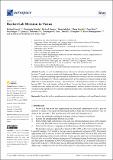Rocket Lab Mission to Venus
Author(s)
French, Richard; Mandy, Christophe; Hunter, Richard; Mosleh, Ehson; Sinclair, Doug; Beck, Peter; Seager, Sara; Petkowski, Janusz J.; Carr, Christopher E.; Grinspoon, David H.; Baumgardner, Darrel; on behalf of the Rocket Lab Venus Team,; ... Show more Show less
Downloadaerospace-09-00445.pdf (6.039Mb)
Publisher with Creative Commons License
Publisher with Creative Commons License
Creative Commons Attribution
Terms of use
Metadata
Show full item recordAbstract
Regular, low-cost Decadal-class science missions to planetary destinations will be enabled by high-ΔV small spacecraft, such as the high-energy Photon, and small launch vehicles, such as Electron, to support expanding opportunities for scientists and to increase the rate of science return. The Rocket Lab mission to Venus is a small direct entry probe planned for baseline launch in May 2023 with accommodation for a single ~1 kg instrument. A backup launch window is available in January 2025. The probe mission will spend about 5 min in the Venus cloud layers at 48–60 km altitude above the surface and collect in situ measurements. We have chosen a low-mass, low-cost autofluorescing nephelometer to search for organic molecules in the cloud particles and constrain the particle composition.
Date issued
2022-08-13Department
Massachusetts Institute of Technology. Department of Earth, Atmospheric, and Planetary Sciences; Massachusetts Institute of Technology. Department of Physics; Massachusetts Institute of Technology. Department of Aeronautics and AstronauticsPublisher
Multidisciplinary Digital Publishing Institute
Citation
Aerospace 9 (8): 445 (2022)
Version: Final published version